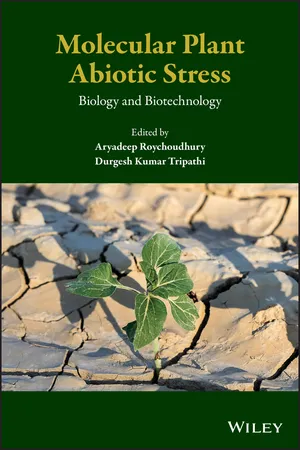
Molecular Plant Abiotic Stress
Biology and Biotechnology
- English
- ePUB (mobile friendly)
- Available on iOS & Android
Molecular Plant Abiotic Stress
Biology and Biotechnology
About This Book
A close examination of current research on abiotic stresses in various plant species
The unpredictable environmental stress conditions associated with climate change are significant challenges to global food security, crop productivity, and agricultural sustainability. Rapid population growth and diminishing resources necessitate the development of crops that can adapt to environmental extremities. Although significant advancements have been made in developing plants through improved crop breeding practices and genetic manipulation, further research is necessary to understand how genes and metabolites for stress tolerance are modulated, and how cross-talk and regulators can be tuned to achieve stress tolerance.
Molecular Plant Abiotic Stress: Biology and Biotechnology is an extensive investigation of the various forms of abiotic stresses encountered in plants, and susceptibility or tolerance mechanisms found in different plant species. In-depth examination of morphological, anatomical, biochemical, molecular and gene expression levels enables plant scientists to identify the different pathways and signaling cascades involved in stress response. This timely book:
- Covers a wide range of abiotic stresses in multiple plant species
- Provides researchers and scientists with transgenic strategies to overcome stress tolerances in several plant species
- Compiles the most recent research and up-to-date data on stress tolerance
- Examines both selective breeding and genetic engineering approaches to improving plant stress tolerances
- Written and edited by prominent scientists and researchers from across the globe
Molecular Plant Abiotic Stress: Biology and Biotechnology is a valuable source of information for students, academics, scientists, researchers, and industry professionals in fields including agriculture, botany, molecular biology, biochemistry and biotechnology, and plant physiology.
Frequently asked questions
Information
1
Plant Tolerance to Environmental Stress: Translating Research from Lab to Land
1.1 Introduction
Table of contents
- Cover
- Table of Contents
- List of Contributors
- 1 Plant Tolerance to Environmental Stress: Translating Research from Lab to Land
- 2 Morphological and Anatomical Modifications of Plants for Environmental Stresses
- 3 Stomatal Regulation as a Drought‐tolerance Mechanism
- 4 Antioxidative Machinery for Redox Homeostasis During Abiotic Stress
- 5 Osmolytes and their Role in Abiotic Stress Tolerance in Plants
- 6 Elicitor‐mediated Amelioration of Abiotic Stress in Plants
- 7 Role of Selenium in Plants Against Abiotic Stresses: Phenological and Molecular Aspects
- 8 Polyamines Ameliorate Oxidative Stress by Regulating Antioxidant Systems and Interacting with Plant Growth Regulators
- 9 Abscisic Acid in Abiotic Stress‐responsive Gene Expression
- 10 Abiotic Stress Management in Plants: Role of Ethylene
- 11 Crosstalk Among Phytohormone Signaling Pathways During Abiotic Stress
- 12 Plant Molecular Chaperones: Structural Organization and their Roles in Abiotic Stress Tolerance
- 13 Chloride (Cl−) Uptake, Transport, and Regulation in Plant Salt Tolerance
- 14 The Root Endomutualist Piriformospora indica: A Promising Bio‐tool for Improving Crops under Salinity Stress
- 15 Root Endosymbiont‐mediated Priming of Host Plants for Abiotic Stress Tolerance
- 16 Insight into the Molecular Interaction Between Leguminous Plants and Rhizobia Under Abiotic Stress
- 17 Effect of Nanoparticles on Oxidative Damage and Antioxidant Defense System in Plants
- 18 Marker‐assisted Selection for Abiotic Stress Tolerance in Crop Plants
- 19 Transgenes: The Key to Understanding Abiotic Stress Tolerance in Rice
- 20 Impact of Next‐generation Sequencing in Elucidating the Role of microRNA Related to Multiple Abiotic Stresses
- 21 Understanding the Interaction of Molecular Factors During the Crosstalk Between Drought and Biotic Stresses in Plants
- Index
- End User License Agreement